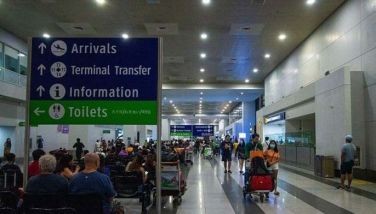Phl takes travel advisories to UN Security Council
MANILA, Philippines - The Philippines has urged the United Nations Security Council to take a “balanced” approach to addressing international terrorism and called on governments to “exercise due care and diligence” in issuing travel alerts.
Philippine Deputy Permanent Representative (DPR) Carlos Sorreta issued the call during a Security Council meeting on Nov. 15. He said counterterrorism strategies “must be comprehensive” and that terror threats “must be addressed by a combination of hard and soft approaches.”
He urged foreign governments to exercise care in the issuance of travel advisories, particularly in response to “possible terrorist attacks.”
“Travel advisories are taken very seriously. Once issued, travel advisories cannot be taken back,” Sorreta said.
“While the Philippines recognizes the responsibility of states to protect their citizens, we believe governments must exercise due care and diligence in issuing travel advisories. It affects not just traveling citizens but also the lifeline and the economy of a country that is the subject of a travel advisory,” he said.
“Governments must clearly distinguish between threats posed by ordinary criminal elements and those by terrorists, two very distinct categories,” he pointed out.
He said issuing a travel advisory that does not distinguish between ordinary crimes and terrorism is “a disservice to the country issuing it and country that is subject to it.”
The Philippines was recently the subject of travel alerts from the United States, United Kingdom, New Zealand, Canada and Australia. The advisories came after the discovery in the UAE of mail bomb bound for the US.
In a separate statement, Philippine Permanent Representative to the UN Libran Cabactulan cited the importance of the country’s aggressively voicing its stand with the Security Council regarding counterterrorism.
The Philippines earlier raised the issue of travel advisories during the ASEAN Summit and the APEC meetings.
“The Security Council has the primary responsibility under the UN Charter for the maintenance of international peace and security. It is the most appropriate venue to discuss ways forward in the collective fight against terrorism and to express concerns at how the international community is addressing terrorism, including travel advisories,” Cabactulan said.
The Security Council is made up of five permanent members – China, France, the Russian Federation, United Kingdom and the United States – and 10 non-permanent members on rotation. This year, the non-permanent members are Austria, Bosnia and Herzegovina, Brazil, Gabon, Japan, Lebanon, Mexico, Nigeria, Turkey, and Uganda.
Terror money
Meanwhile, the military has raised the possibility of remittances from overseas Filipino workers being used by the Abu Sayyaf to finance their operations.
“It is not remote that it (remittances being sent to Abu Sayyaf) may happen. Remember that some of our Filipino brothers living in sensitive areas may have OFW family members,” Armed Forces spokesman Brig. Gen. Jose Mabanta Jr. said in a press briefing yesterday.
“Imagine, all you have to do is to deposit it (money) abroad and then deposit it into an account,” he said.
“It is hard to monitor the influx or coming in of funds,” he added.
“Remember, some parts of the remittances are not coursed through official means. There is a possibility that a miniscule amount may end up in the wrong hands,” the AFP spokesman said.
Mabanta said another factor that makes the monitoring of remittance inflows hard is the amount of money sent.
“(Remittances sent) in small increments, they (authorities) do not question,” he said.
Mabanta, however, admitted they have yet to receive reports of remittances ending up in terrorists’ hands.
In a recent report, the US State Department said the Abu Sayyaf is using OFW remittances to finance their operations.
“The (Abu Sayyaf) is funded through acts of ransom and extortion and may receive funding from external sources such as remittances from overseas Filipino workers (OFW) and possibly Middle East-based extremists,” the report read.
The report, nevertheless, cited breakthroughs in the Philippines’ campaign against terrorism, citing for instance the killing of 10 Abu Sayyaf members last year.
“They (Abu Sayyaf) are now down to 300 and they only operate in pockets... (This is due to) the success of our effort to convince people that this (violence) will not lead to anything,” he said.
Latest data from the Bangko Sentral ng Pilipinas showed that OFW remittances reached $13.8 billion in September. – With Alexis Romero
- Latest
- Trending






























